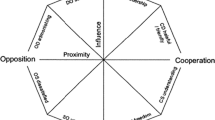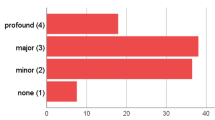Abstract
Today’s science, technology, engineering, and mathematics (STEM) graduate students and postdoctoral fellows are tomorrow’s new faculty members; but these junior academicians often receive limited pedagogical training. We describe four iterations of an entry-level program with a low time commitment, Mentored Discussions of Teaching (MDT). The program is designed to introduce participants to pedagogical issues and literature in STEM disciplines and foster related discussions. It consists of group meetings, classroom observations, and discussions with faculty members. Program components were generally highly rated and valuable, even for those with prior teaching experience. We have found that this program is also an effective way to engage faculty members in the teaching aspects of students’ professional development.



Similar content being viewed by others
References
Anderson, W. A., Banerjee, U., Drennan, C. L., Elgin, S. C., Epstein, I. R., Handelsman, J., et al. (2011). Changing the culture of science education at research universities. Science, 331, 152–153.
Arons, A. B. (1985). "Critical thinking" in the baccalaureate curriculum. Liberal Education, 71, 141–158.
Austin, A. E., Campa, H., Pfund, C., Gillian-Daniel, D. L., Mathieu, R., & Stoddart, J. (2009). Preparing STEM doctoral students for future faculty careers. New Directions for Teaching and Learning, 2009(117), 83–95.
Baldwin, R. G. (2009). The climate for undergraduate teaching and learning in STEM fields. New Directions for Teaching and Learning, 2009(117), 9–17.
Bransford, J., Brown, A. L., & Cocking, R. R. (2000). How people learn: Brain, mind, experience, and school (expanded ed.). Washington, DC: National Research Council.
Connolly, M. R. (2010-2011). Helping future faculty “come out” as teachers. Essays on Teaching Excellence: Toward the Best in the Academy, vol. 22, no. 6. Nederland, CO: Professional & Organizational Development Network in Higher Education.
Feldon, D. F., Peugh, J., Timmerman, B. E., Maher, M. A., Hurst, M., Strickland, D., et al. (2011). Graduate students' teaching experiences improve their methodological research skills. Science, 333, 1037–1039.
Golde, C. M., & Dore, T. M. (2001). At cross purposes: What the experiences of today's doctoral students reveal about doctoral education. Philadelphia, PA: The Pew Charitable Trusts.
Helm, M., Campa, H., & Moretto, K. (2012). Professional socialization for the Ph.D.: An exploration of career and professional development preparedness and readiness for Ph.D. candidates. Journal of Faculty Development, 26(2), 5–23.
Mazur, E. (2009). Farewell, lecture? Science, 323, 50–51.
National Research Council (1989). Everybody counts: A report to the nation on the future of mathematics education. Washington, DC: National Research Council and Mathematical Sciences Education Board.
Pascarella, E. T., Salisbury, M. H., & Blaich, C. (2011). Exposure to effective instruction and college student persistence: A multi-institutional replication and extension. Journal of College Student Development, 52, 4–19.
Pfund, C., Mathieu, R., Austin, A., Connolly, M., Manske, B., & Moore, K. (2012). Advancing STEM undergraduate learning: Preparing the nation's future faculty. Change: The Magazine of Higher Learning, 44(6), 64–72.
Pruitt-Logan, A. S., & Gaff, J. G. (2004). Preparing future faculty: Changing the culture of doctoral education. In D. H. Wulff & A. E. Austin (Eds.), Paths to the professoriate: Strategies for enriching the preparation of future faculty (pp. 177–193). San Francisco, CA: Jossey-Bass.
Russo, G. (2011). Graduate students: Aspirations and anxieties. Nature, 475, 533–535.
Tanner, K., & Allen, D. (2007). Cultural competence in the college biology classroom. CBE - Life Sciences Education, 6, 251–258.
The President’s Council of Advisors on Science and Technology. (2012). Report to the President. Engage to excel: Producing one million additional college graduates with degrees in science, technology, engeineering, and mathematics. Washington, DC: Executive Office of the President.
Vergara, C. E., Urban-Lurain, M., Campa, H. I., Cheruvelil, K. S., Ebert-May, D., Fata-Hartley, C., et al. (2014). FAST-Future Academic Scholars in Teaching: A high-engagement development program for future STEM faculty. Innovative Higher Education, 39, 93–107.
Wurgler, E., VanHeuvelen, J. S., Rohrman, S., Loehr, A., & Grace, M. K. (2014). The perceived benefits of a preparing future faculty program and its effect on job satisfaction, confidence, and competence. Teaching Sociology, 42, 50–60.
Acknowledgments
The authors wish to thank Ms. Louise Edwards Neiman for her helpful contributions in co-running Year 1 of the program and collecting evaluation data. Additional thanks are owed to Drs. Denise Drane and Luke Flores for constructive comments on earlier drafts of this manuscript. Much gratitude is owed to the participants and faculty mentors without whom this program would not be possible.
Author information
Authors and Affiliations
Corresponding author
Rights and permissions
About this article
Cite this article
Baiduc, R.R., Linsenmeier, R.A. & Ruggeri, N. Mentored Discussions of Teaching: An Introductory Teaching Development Program for Future STEM Faculty. Innov High Educ 41, 237–254 (2016). https://doi.org/10.1007/s10755-015-9348-1
Published:
Issue Date:
DOI: https://doi.org/10.1007/s10755-015-9348-1




